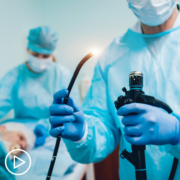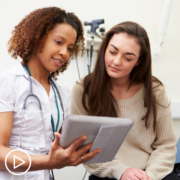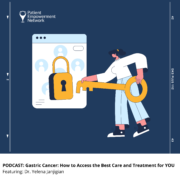What Gastric Cancer Challenges Do Asian and Hispanic Groups Face?
What Gastric Cancer Challenges Do Asian and Hispanic Groups Face? from Patient Empowerment Network on Vimeo.
What kind of gastric cancer care barriers do Asian and Hispanic groups face? Expert Dr. Jun Gong from Cedar-Sinai Medical Center discusses specific barriers that are experienced by some patient groups and some solutions to overcome barriers.
Download Resource Guide | Descargar guía de recursos
See More from [ACT]IVATED Gastric Cancer
Related Resources:

|

|

|
Transcript:
Lisa:
What are the challenges faced by the Asian and Hispanic populations in accessing timely and appropriate treatment for stomach cancer and what strategies can be implemented to address these challenges?
Dr. Jun Gong:
There are several challenges that we see in our routine care of patients that are of Hispanic or Asian ethnicity with regards to access to treatment to stomach cancer. This often involves language barriers where, at least here geographically in Los Angeles, it’s a culturally diverse population, large metropolitan center where patients often speak non-English language. And this is often a barrier to communicating and getting timely access. Other concepts that we’ve come into as well is fear of insurance coverage denials in seeing the subspecialists or access to timely diagnostics and approval of treatments through insurance.
Other barriers include transportation. We have patients that actually have transportation issues. And although they try to take public transportation or whatever means necessary to get here, this still represents a formidable barrier to access. Other access related barriers that we often see is also caregiver support.
Here, patients are…stomach cancer is a quite complex illness. It can affect diet, it can affect strength. And so oftentimes these patients need more support to help with their daily activities as well. And so these are just a few of the growing kinds of risk factors or access related barriers that we’ve seen. How do we overcome this, is one of the major dilemmas right now in all of cancer care and medicine, in my opinion, not just exclusive to stomach cancer.
What I think is important here is advocacy groups. There are a lot of good stomach cancer advocacy groups such as the ones we’re participating under today. These can be accessed through public publicly available means either through word of mouth. They’re often health fairs that are a good place to distribute this.
I often think public libraries are also a great place for healthcare advocacy and connections. Obviously, the Internet is also one good means for doing this, but not all patients have internet access as well. So this is something that you also have to play into. As part of our clinical care team, we have our social worker and our case management teams that really comprise an important social, psychosocial resource to our patients where we do our best to connect them with advocacy support groups where we can connect them with resources such as transportation.
We certainly are more than happy to help with insurance related questions as well. And then another point I forgot to mention as well is that when you embark on treatment, sometimes patients are really debilitated and they’re not able to carry on their normal means of a living. And so here our supportive services teams within our cancer care team can really help with the financial impact of being on treatment such as chemotherapy for a period of time as well.









